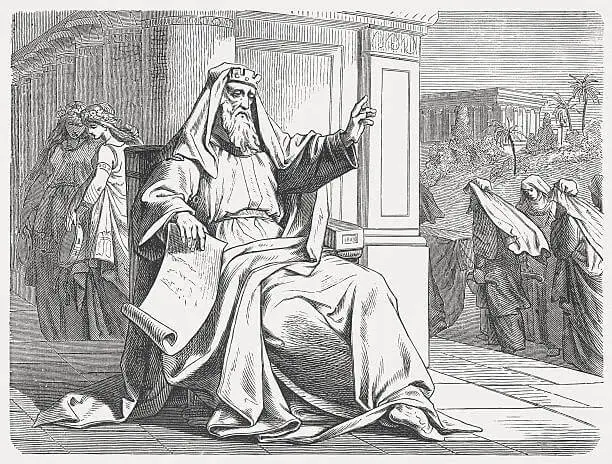King Solomon is a household name in Israel’s genealogy and the Christian faith.
He reigned in the Asian country from 970-931 BC. He’s recorded in the Bible as the wisest and wealthiest king Israel has ever had.
During his reign, Israel experienced peace and a massive territory.
The success of his reign is largely due to the efforts of his father, King David, who fought many battles and led Israel well.
King Solomon is sometimes said to be dark-skinned or simply ‘black’.
Africans have, in many instances claimed that the famous king was one of their own.
For instance, the Ethiopian Orthodox Church claims that Solomon was the father of Menelik I, the founder of the Solomonic dynasty that ruled Ethiopia until 1974.
According to their account, Menelik was the son of Solomon and the Queen of Sheba, who brought the Ark of the Covenant from Jerusalem to Ethiopia.
The Lemba people, a Bantu-speaking group in southern Africa, also claim to be descendants of Israelites who migrated from Yemen after the destruction of the First Temple by Babylonians.
Some scholars also link King Solomon’s black heritage to his rich cultural and religious ties with Africa.
They argue that 1 Kings 4:29 portrays Solomon as a wise and wealthy king who had extensive trade and diplomatic relations with various nations, including those in Africa.
He received gold, spices, ivory, and animals from Africa as gifts or tribute.
He also worshipped some African deities along with Yahweh, such as Ashtoreth (the goddess of the Sidonians), Milcom (the god of the Ammonites), and Chemosh (the god of Moab).
These deities were related to ancient Egyptian gods and goddesses, such as Isis, Amun, and Montu.
Based on the above accounts and others that we haven’t included in this post, many people from other ethnicities have also come to conclude that King Solomon may have been a black African.
But is it the truth? Was King Solomon black?
The Origin Of The Debate
The mega debate about King Solomon’s race originated from the Bible.
The exact passage is Song of Solomon 1:5-6.
I am black, but comely, O ye daughters of Jerusalem, as the tents of Kedar, as the curtains of Solomon.
The person speaking is talking to their beloved telling them to look away as he was black as the tents of Kedar and Curtains of Solomon. The Message and NIV translations use the word “dark” in place of black.
The Songs of Solomon is a book written by King Solomon – the wisest man in the Bible.
As such, some believe that every word penned in the book is the words of the king – obviously inspired by the Holy Spirit.
But this is further from the truth. Check out the argument below:
The Truth
The honest truth is that King Solomon wasn’t black. Or, to be precise, there is nowhere that points to him being black or white from the verses above.
There are two reasons for this.
1. King Solomon Didn’t Say The Words
First, those are not the words of King Solomon himself but of a woman he’s romantically involved with.
Granted, the king of old wrote the book of the Bible but not all words in it are from him.
The Song of Solomon is pretty much a conversation between the king, the woman in question, the daughters of Jerusalem, and the watchman about romantic love.
The woman starts speaking about the man she loves right from the first chapter.
The point at which she claims to be black is simply a continuation of her statement not that of the King.
It is the same case as the first five books of the Bible.
Bible Scholars believe that Moses penned all five of them. However, if you are a student of the Bible, you know that Moses came into the scene in Exodus.
He wasn’t there when the world was created or when Noah built the ark during the time of the flood.
The Holy Spirit is believed to have guided him to write the books.
2. King Solomon Is Straight
Here’s another proof that the words in Song of Solomon 1:5-6 aren’t his.
In case you are still not convinced that these words are not of the author of the book, check out verse two of the same chapter.
Let him kiss me with the kisses of his mouth: for thy love is better than wine
The person talking asks the man to kiss them with the kisses of his mouth.
The word ‘his’ comes out strongly to suggest that the person being spoken to is male.
If the one speaking is also male, it means one thing – King Solomon was gay.
Well, this goes against everything Solomon is known for.
According to the Bible, the man had 700 wives and 300 concubines. This makes a total of 1000 women.
He would marry women for political or romantic reasons. He didn’t care what God had told him about marrying outside of Israel.
Eventually, the many women introduced idol worship to him—the very thing that brought him down.
So, there’s no way King Solomon was homosexual.
To drive the point home, verse 13 is evident that the speaker is a woman.
“My beloved is to me a pouch of myrrh which lies all night between my breasts.”
She says that her beloved will ‘lie all night between her breasts.’ The word ‘breasts’ in Hebrew means a female’s mammary glands. This is not to be confused with artificial breasts which have become rampant these days.
Both of the explanations above don’t prove the ethnicity of King Solomon in any way.
He does make some statements later in the book but verses 5 and 6 of chapter 1 of Song of Solomon aren’t his.
The Deeper Meaning

The book of Song of Solomon has a literal and deeper meaning.
The former is what we’ve been talking about.
Then there’s the deeper meaning. Essentially, God is talking about the relationship between Christ (his son) and the bride (his church).
The bride longs to be in the presence of the Lord Jesus. She cannot wait until she enters his chambers and has a private moment with him. His followers long for intimate time spent with the Lord.
When the lady claims that she is black, she is telling Jesus that she’s unclean.
In the early days, Hebrews always strayed from the true God to worship other gods.
They would go back to God in repentance and he would forgive them.
The black color here can be interpreted to exemplify the same.
The woman knows she’s sinned. She’s been outside in the sun where her image has been tampered with. She knows Christ isn’t attracted by her dark color (sin) and asks him to not look at him.
This aspect is important in showing that the book is about a king and his bride or simply a man and a woman. The woman is the one claiming that she’s black and not the man.
Black Has Been Misinterpreted
It is also worth saying that the word “black” in the Song of Solomon isn’t what it sounds like.
It is believed by many to mean having African American skin.
However, the meaning is rather different.
The woman speaking who is believed to be wasn’t a black woman.
When she spoke of being black, she only meant that the sun had darkened her skin a bit.
She claims that she’d spent a lot of time outdoors, thanks to her siblings who made her keep the vineyards.
Because of being out in the sun, her skin took on a darker complexion.
If you’ve ever been to Israel, you have probably interacted with the unforgiving heat over there.
The entire country is a desert. During the day, the heat is sweltering.
When one stays outdoors during the noonday sun, their skin will get a tan.
Back then, having a tan was a different ballgame compared to today.
No man wanted a darker woman. The lighter and pale you were, the more men you will attract.
The woman knew this and would ask her beloved to not look at her.
Therefore, black here denotes being tanned rather than having naturally black skin.
Other Notable Arguments

I. Solomon’s Father Was a White Israelite Man
According to 2 Samuel 12:24, Solomon’s father was David, the second king of Israel and Judah, who belonged to the tribe of Judah.
The Israelites were descendants of Abraham, Isaac, and Jacob (also known as Israel), who originated from Mesopotamia (modern Iraq).
They were part of the Semitic group of people who inhabited parts of Asia and Africa in ancient times.
The Semites were white or light-skinned people who had different physical features from the Hamites or Cushites (black Africans).
II. He Ruled Over a White Israelite Nation
The Bible portrays Solomon as the ruler of a united kingdom that comprised all the tribes of Israel (from Dan to Beersheba).
He inherited this kingdom from his father David, who had conquered it from its enemies such as the Philistines, the Moabites, and the Ammonites.
These enemies were also Semitic peoples who shared a common ancestry and culture with the Israelites.
As we seen above, the Semites were white or light-skinned people, which implies one thing: that Solomon’s kingdom was predominantly white or light-skinned.
He would have been an anomaly if he was black or dark-skinned.
III. He Was Not Revered As a Prophet or a King by Most African Groups
The traditions and legends that link Solomon with Africa and its people are not based on historical evidence but on oral transmission, religious beliefs, or political agendas.
The Ethiopian Orthodox Church’s claim that Solomon was the father of Menelik I is not supported by any archaeological or textual proof, and it was likely a way of legitimizing their royal lineage and their Christian faith.
The Lemba people’s claim that they are descendants of Israelites is also disputed by some geneticists and historians, who argue that their genetic marker could have come from other sources or migrations.
Most other African groups do not have any connection or affinity with Solomon or his legacy.
The Verdict
When you read the first chapter of the Song of Solomon, you’d be forgiven for thinking the man was black.
Verses 5 and 6 literally have the words ‘black’ in them.
But a closer look reveals that the words are spoken by a woman and not the king himself.
It is thus safe to say that King Solomon wasn’t black as some believe he was.
King Solomon’s father’s origin, his rule over a white Israelite nation, and his lack of reverence by most African groups serve as additional arguments against the belief that he was black.
To this end, perhaps the most important thing to remember is that Solomon was a complex and influential figure who had an impact on many cultures and religions, regardless of his skin color.
You may also want to check: Was King James Black?

